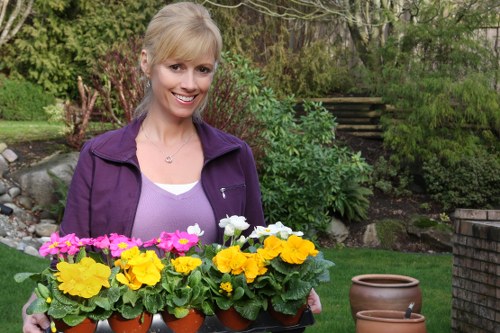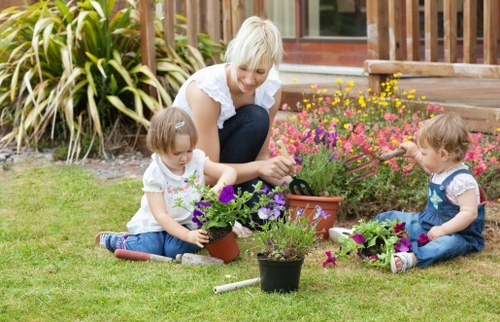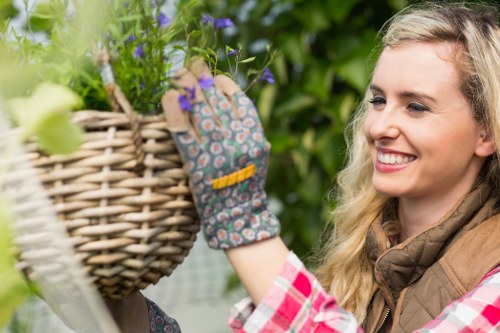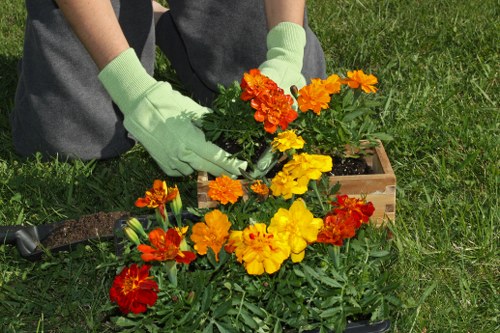Gardener Acton: Your Ultimate Guide to Gardening in Acton

Gardening is not just a hobby; it's a way to connect with nature, create a beautiful space, and even improve your mental health. In Acton, gardening enthusiasts have a unique environment that offers both challenges and opportunities. Whether you're a seasoned gardener or just starting, understanding the specifics of gardening in Acton can help you achieve a thriving garden.
Acton is known for its diverse climate and soil conditions, which can significantly impact gardening practices. The area experiences a temperate climate with distinct seasons, providing a rich variety of plants that can flourish throughout the year. However, the local soil composition may require some adjustments to ensure optimal plant growth.
One of the first steps to successful gardening in Acton is selecting the right plants. With numerous native and adaptable species, gardeners have a plethora of options. From vibrant flowers to sturdy vegetables, choosing plants that are well-suited to the local environment can make a significant difference in your garden’s success.

Understanding Acton's Climate
The climate in Acton plays a crucial role in gardening. With mild winters and warm summers, the region provides a favorable environment for a wide range of plants. However, gardeners must be mindful of seasonal changes and plan accordingly to protect their plants from extreme weather conditions.
Rainfall in Acton is generally well-distributed throughout the year, but there can be periods of drought or heavy rains. Implementing effective water management strategies, such as rainwater harvesting and drip irrigation, can help maintain consistent moisture levels in the soil.
Temperature fluctuations can also affect plant health. It's essential to select plants that can tolerate the highs and lows typical of Acton's climate. Additionally, using mulch and other soil amendments can help regulate soil temperature, providing a more stable environment for plant roots.

Soil Conditions in Acton
Understanding the soil composition in Acton is vital for successful gardening. The region's soil varies from sandy loam to clay, each with its own set of characteristics. Sandy loam soils offer good drainage but may require additional organic matter to retain moisture. Clay soils, on the other hand, hold water well but can become compacted, limiting root growth.
Conducting a soil test is highly recommended to determine the pH level and nutrient content of your garden soil. Acton's soil typically leans slightly acidic to neutral, which is suitable for a wide range of plants. However, adding lime or sulfur can help adjust the pH to match the specific needs of your chosen plants.
Incorporating compost and other organic materials can improve soil structure, enhance fertility, and promote beneficial microbial activity. Regularly amending the soil will ensure that your garden remains healthy and productive throughout the seasons.

Selecting the Right Plants for Acton
Choosing plants that thrive in Acton's climate and soil conditions is essential for a flourishing garden. Here are some popular choices:
- Perennials: Plants like lavender, daylilies, and coneflowers are excellent choices as they return year after year with minimal maintenance.
- Vegetables: Tomatoes, peppers, and leafy greens like spinach and kale grow well in Acton's climate, provided they receive adequate sunlight and water.
- Herbs: Basil, rosemary, and thyme are not only useful in the kitchen but also add a pleasant aroma to your garden.
- Flowers: Roses, tulips, and marigolds can add vibrant colors and attract pollinators to your garden.
Additionally, incorporating native plants can offer benefits such as lower maintenance requirements and better resistance to local pests and diseases.

Gardening Techniques for Acton
Adopting the right gardening techniques can enhance the productivity and health of your garden. Here are some methods tailored for Acton gardeners:
- Raised Beds: Building raised beds can improve drainage and provide better soil conditions for plant roots, especially in areas with heavy clay soil.
- Companion Planting: This involves planting compatible species together to enhance growth, deter pests, and improve yields.
- Mulching: Applying mulch helps retain soil moisture, suppress weeds, and regulate soil temperature.
- Crop Rotation: Rotating crops each season can prevent soil depletion and reduce the risk of pests and diseases.
- Integrated Pest Management (IPM): This sustainable approach focuses on using natural predators and environmentally friendly methods to control pests.
Implementing these techniques can lead to a more sustainable and productive garden, making the most of Acton's unique gardening conditions.
Gardening in Acton is a rewarding experience that allows you to create a personal oasis while contributing to the local ecosystem. By understanding the climate, soil, and appropriate gardening practices, you can cultivate a beautiful and thriving garden.
Moreover, community gardening initiatives in Acton offer opportunities to connect with fellow gardening enthusiasts, share knowledge, and participate in local environmental efforts. Engaging with these communities can provide additional support and inspiration for your gardening journey.
Whether you're growing flowers, vegetables, or herbs, the key to success lies in planning, patience, and a willingness to adapt to the local conditions. With the right approach, your garden in Acton can become a source of pride and joy for years to come.
Local Gardening Resources in Acton
Acton offers a variety of resources to support gardeners of all levels. From nurseries and garden centers to botanical gardens and community workshops, there's no shortage of places to find inspiration and guidance.
- Acton Garden Center: A local hub for purchasing plants, tools, and supplies, as well as receiving expert advice.
- Acton Botanical Garden: A beautiful space to explore diverse plant species and attend educational events.
- Community Workshops: Regular classes and seminars on topics ranging from composting to organic gardening techniques.
- Local Gardening Clubs: Join groups of like-minded individuals to share tips, organize events, and collaborate on gardening projects.
Taking advantage of these resources can enhance your gardening skills and connect you with a supportive community in Acton.
Additionally, online forums and social media groups dedicated to Acton gardening provide platforms to ask questions, share experiences, and stay updated on the latest gardening trends and events in the area.
Leveraging these resources ensures that you have the knowledge and support needed to maintain a successful garden in Acton.
Challenges of Gardening in Acton
While gardening in Acton offers many benefits, it also comes with its set of challenges. Understanding these obstacles can help you develop strategies to overcome them and ensure the longevity of your garden.
- Pest Control: Common pests in Acton include aphids, caterpillars, and slugs. Implementing natural pest control methods, such as introducing beneficial insects or using organic repellents, can help manage these issues.
- Disease Management: Fungal diseases like powdery mildew and blight can affect plant health. Ensuring proper spacing, adequate sunlight, and good air circulation can reduce the risk of disease.
- Weather Extremes: Unexpected weather patterns, such as heavy rains or heatwaves, can impact your garden. Having contingency plans, like installing shade cloths or building rain shelters, can protect your plants during extreme conditions.
- Soil Health: Maintaining soil fertility requires regular addition of compost and organic matter. Testing soil regularly ensures that nutrient levels remain balanced.
By acknowledging and preparing for these challenges, gardeners in Acton can maintain healthy and vibrant gardens throughout the year.
Additionally, staying informed about local gardening issues through newsletters and community updates can help you stay ahead of potential problems and adapt your gardening practices accordingly.
Sustainable Gardening Practices in Acton
Embracing sustainable gardening practices not only benefits your garden but also contributes to the overall health of the environment in Acton. Here are some eco-friendly methods to consider:
- Composting: Recycling kitchen scraps and garden waste into compost enriches the soil and reduces landfill waste.
- Rainwater Harvesting: Collecting and utilizing rainwater for irrigation conserves water and minimizes reliance on municipal sources.
- Native Planting: Growing native plants supports local wildlife and requires less maintenance and resource input.
- Organic Gardening: Avoiding synthetic fertilizers and pesticides promotes a healthier ecosystem and safer produce.
- Energy-Efficient Tools: Using manual or electric tools instead of gas-powered ones reduces your carbon footprint.
Implementing these sustainable practices helps create a resilient garden that thrives in Acton's environment while protecting natural resources.
Moreover, participating in local sustainability initiatives and workshops can provide additional insights and support for your eco-friendly gardening efforts.
By prioritizing sustainability, you contribute to the preservation of Acton's natural beauty and ensure that future generations can enjoy lush and vibrant gardens.
10-15 Closest Areas to Acton for Gardeners
Gardening enthusiasts in Acton have several nearby areas to explore and gain inspiration. Each of these locations offers unique features that cater to different gardening interests:
- West Acton: Just a short drive from Acton, West Acton boasts several community gardens and local nurseries offering a wide selection of plants.
- East Acton: Known for its extensive green spaces and botanical gardens, East Acton is perfect for those seeking diverse plant species and educational resources.
- North Acton: This area features numerous parks and recreational gardens, providing ample space for experimenting with different gardening styles.
- South Acton: South Acton is home to urban farming initiatives and sustainable gardening projects, ideal for eco-conscious gardeners.
- Central Acton: Central Acton offers access to several garden centers and workshops, making it a hub for gardening supplies and knowledge.
- Acton Highlands: With its elevated terrain, Acton Highlands provides unique microclimates suitable for specialized plants and rare species.
- Greenwood Acton: Greenwood is renowned for its community-driven gardening events and seasonal plant fairs.
- Lakeside Acton: The proximity to lakes in this area allows for water gardening and the cultivation of aquatic plants.
- Riverside Acton: Riverside Acton offers fertile soil and irrigation advantages, making it ideal for vegetable and herb gardens.
- Meadow Acton: With open meadows and wildflower fields, this area is perfect for creating naturalistic and pollinator-friendly gardens.
- Sunny Acton: As the name suggests, Sunny Acton receives ample sunlight, ideal for sun-loving plants and solar-powered garden installations.
- Shade Acton: For gardeners who prefer or require shaded areas, Shade Acton provides the perfect environment for shade-tolerant plants.
- Hilltop Acton: The hilltop locations offer panoramic views and opportunities for terraced gardening and rock gardens.
- Brookside Acton: With its gentle brooks and streams, Brookside Acton is ideal for creating serene water features and lush, green landscapes.
Exploring these nearby areas can provide new ideas, resources, and opportunities to enhance your gardening experience in Acton.
Conclusion
Gardening in Acton is a fulfilling endeavor that combines the beauty of nature with the satisfaction of cultivation. By understanding the local climate, soil conditions, and adopting effective gardening techniques, you can create a vibrant and sustainable garden.
Engaging with the local gardening community and utilizing the available resources ensures that you have the support and knowledge needed to overcome challenges and achieve success.
Whether you're growing ornamental plants, vegetables, or herbs, the key to a thriving garden in Acton lies in preparation, adaptability, and a passion for nurturing life.
FAQs About Gardener Acton
- What are the best plants to grow in Acton's climate?
Some of the best plants for Acton's climate include lavender, tomatoes, marigolds, basil, and daylilies. These plants thrive in the temperate conditions and can withstand seasonal changes.
- How can I improve my soil quality in Acton?
Improving soil quality can be achieved by conducting a soil test, adding compost or organic matter, and adjusting the pH levels as needed. Regularly amending the soil helps maintain fertility and structure.
- What sustainable practices are recommended for gardeners in Acton?
Sustainable practices include composting, rainwater harvesting, using native plants, practicing organic gardening, and utilizing energy-efficient tools. These methods help create an eco-friendly and resilient garden.
- Where can I find gardening resources in Acton?
You can find gardening resources at local garden centers, Acton Botanical Garden, community workshops, and online forums dedicated to Acton gardening. These resources offer supplies, knowledge, and support.
- What challenges do gardeners face in Acton?
Common challenges include pest control, disease management, weather extremes, and maintaining soil health. Implementing effective strategies and staying informed can help overcome these obstacles.